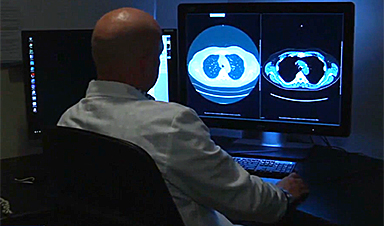Marla Kott was diagnosed with Stage 4 lung cancer on Nov. 21, 2014. It was her 60th birthday.
"It was not a great day," said Kott, who was was one of thousands of people in Canada diagnosed with lung cancer that year.
The disease accounts for a quarter of cancer deaths, according to the Canadian Cancer Society. The society says the five-year survival rate is 62 per cent for those diagnosed with Stage 1 lung cancer, and drops to three per cent for Stage 4.
It took about a year for Kott to be diagnosed, after undergoing numerous tests to determine what was wrong.
Against the odds, Kott is still going strong nine years later — but the Vancouver resident wishes there had been a way to detect her cancer sooner.
"I might have been able to have surgery and be done with it," she said, imagining scenarios in which the disease was discovered early and fully treated.
Researchers with B.C. Cancer in Vancouver are now working to develop a breath test that could help show signs of cancer earlier, and screen more people, more easily.
"When we exhale, we exhale over 1,000 volatile organic compounds," said team co-lead Dr. Renelle Myers, adding that some of these compounds have the potential to indicate cancer development.
Myers first began studying breath samples in 2020, when she opened what she says is the first clinical breath lab in Canada. When the pandemic hit, her team pivoted from cancer research to looking at the detection of COVID through breath.
"If we can find that fingerprint of an early lung cancer, that will help us screen, much more easily, many, many people around the province and around the world."
Additionally, researchers hope the test will help them understand how changes in the lungs might indicate cancer development in people who have never smoked.
"We are seeing an alarming increase of lung cancer in never-smokers," Myers said.
A study published by B.C. Cancer in June 2023 found that 33 per cent of lung cancer patients in Vancouver had never used tobacco products, and suggested air pollution might be the cause — in particular, a particle called PM2.5, levels of which are higher in B.C. during wildfire season.
AI organizing data
The test researchers are working on uses artificial intelligence to sift through data.
"There's thousands of compounds in a single breath," Myers said, adding that AI helps organize people by age, risk factors and other indicators of cancer.
"Even if our team works 24/7, we couldn't process all the samples required for these large, multi-centre studies with only the system we have now," research team co-lead Dr. Stephen Lam said. "Especially since samples can't be stored for very long once collected."
Currently, the best way to diagnose lung cancer is through a CT (computed tomography) scan, Myers said. But other tests, including blood tests, X-rays, MRIs, ultrasounds and biopsies, to name a few, can be part of the determination.
"The majority of patients who are diagnosed with lung cancer are diagnosed at a late stage when they become symptomatic," Myers said.
The team is in the early stages of nationwide clinical study, having collected nearly 300 samples from individuals in Ontario, B.C. and Quebec. The goal is to look at samples from 4,000 people.
They're looking at pulmonary nodules — small clumps of cells in the lungs — that are often benign but can develop into cancer.
Researchers will follow patients over five years to see how those nodules develop and how breath signatures change in turn.
By being able to identify if a nodule is not cancerous, Myers said patients could be given the all clear, and not have to follow up for several months.
"It's powerful in that it could potentially really reduce downstream resource utilization in our health-care system," she said.
News
Deadly Pancreatic Cancer Found To “Wire Itself” Into the Body’s Nerves
A newly discovered link between pancreatic cancer and neural signaling reveals a promising drug target that slows tumor growth by blocking glutamate uptake. Pancreatic cancer is among the most deadly cancers, and scientists are [...]
This Simple Brain Exercise May Protect Against Dementia for 20 Years
A long-running study following thousands of older adults suggests that a relatively brief period of targeted brain training may have effects that last decades. Starting in the late 1990s, close to 3,000 older adults [...]
Scientists Crack a 50-Year Tissue Mystery With Major Cancer Implications
Researchers have resolved a 50-year-old scientific mystery by identifying the molecular mechanism that allows tissues to regenerate after severe damage. The discovery could help guide future treatments aimed at reducing the risk of cancer [...]
This New Blood Test Can Detect Cancer Before Tumors Appear
A new CRISPR-powered light sensor can detect the faintest whispers of cancer in a single drop of blood. Scientists have created an advanced light-based sensor capable of identifying extremely small amounts of cancer biomarkers [...]
Blindness Breakthrough? This Snail Regrows Eyes in 30 Days
A snail that regrows its eyes may hold the genetic clues to restoring human sight. Human eyes are intricate organs that cannot regrow once damaged. Surprisingly, they share key structural features with the eyes [...]
This Is Why the Same Virus Hits People So Differently
Scientists have mapped how genetics and life experiences leave lasting epigenetic marks on immune cells. The discovery helps explain why people respond so differently to the same infections and could lead to more personalized [...]
Rejuvenating neurons restores learning and memory in mice
EPFL scientists report that briefly switching on three “reprogramming” genes in a small set of memory-trace neurons restored memory in aged mice and in mouse models of Alzheimer’s disease to level of healthy young [...]
New book from Nanoappsmedical Inc. – Global Health Care Equivalency
A new book by Frank Boehm, NanoappsMedical Inc. Founder. This groundbreaking volume explores the vision of a Global Health Care Equivalency (GHCE) system powered by artificial intelligence and quantum computing technologies, operating on secure [...]
New Molecule Blocks Deadliest Brain Cancer at Its Genetic Root
Researchers have identified a molecule that disrupts a critical gene in glioblastoma. Scientists at the UVA Comprehensive Cancer Center say they have found a small molecule that can shut down a gene tied to glioblastoma, a [...]
Scientists Finally Solve a 30-Year-Old Cancer Mystery Hidden in Rye Pollen
Nearly 30 years after rye pollen molecules were shown to slow tumor growth in animals, scientists have finally determined their exact three-dimensional structures. Nearly 30 years ago, researchers noticed something surprising in rye pollen: [...]
NanoMedical Brain/Cloud Interface – Explorations and Implications. A new book from Frank Boehm
New book from Frank Boehm, NanoappsMedical Inc Founder: This book explores the future hypothetical possibility that the cerebral cortex of the human brain might be seamlessly, safely, and securely connected with the Cloud via [...]
How lipid nanoparticles carrying vaccines release their cargo
A study from FAU has shown that lipid nanoparticles restructure their membrane significantly after being absorbed into a cell and ending up in an acidic environment. Vaccines and other medicines are often packed in [...]
New book from NanoappsMedical Inc – Molecular Manufacturing: The Future of Nanomedicine
This book explores the revolutionary potential of atomically precise manufacturing technologies to transform global healthcare, as well as practically every other sector across society. This forward-thinking volume examines how envisaged Factory@Home systems might enable the cost-effective [...]
A Virus Designed in the Lab Could Help Defeat Antibiotic Resistance
Scientists can now design bacteria-killing viruses from DNA, opening a faster path to fighting superbugs. Bacteriophages have been used as treatments for bacterial infections for more than a century. Interest in these viruses is rising [...]
Sleep Deprivation Triggers a Strange Brain Cleanup
When you don’t sleep enough, your brain may clean itself at the exact moment you need it to think. Most people recognize the sensation. After a night of inadequate sleep, staying focused becomes harder [...]
Lab-grown corticospinal neurons offer new models for ALS and spinal injuries
Researchers have developed a way to grow a highly specialized subset of brain nerve cells that are involved in motor neuron disease and damaged in spinal injuries. Their study, published today in eLife as the final [...]























